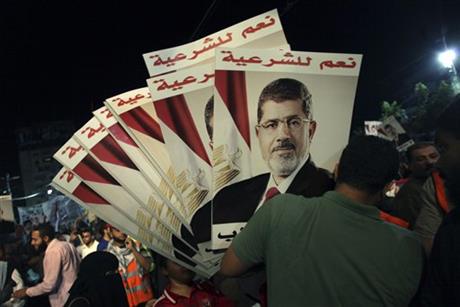
By AYA BATRAWY
A supporter of Egypt’s ousted President Mohammed Morsi holds his posters with Arabic writing which reads ” Yes for legality,” during a protest outside Rabaah al-Adawiya mosque, where protesters have installed a camp and hold daily rallies at Nasr City in Cairo, Egypt, Tuesday, Aug. 6, 2013. (AP Photo/Khalil Hamra)
CAIRO (AP) — Egypt’s presidency said Wednesday that diplomatic efforts to peacefully resolve the standoff between the country’s military-backed interim leadership and the Muslim Brotherhood have failed.
The statement from interim President Adly Mansour’s office follows a flurry of diplomatic visits over the past two weeks by envoys from the United States, the European Union and Arab Gulf states to defuse the crisis between the government and supporters of ousted President Mohammed Morsi, a longtime Brotherhood member.
“These efforts did not achieve the success that was hoped for, despite full support provided by the Egyptian government,” the presidency said. “The state of Egypt appreciates the efforts of friendly nations and understands the reasons why they did not achieve their desired objectives, and holds the Muslim Brotherhood fully responsible for the failure of these efforts.”
The Brotherhood could not be immediately reached for comment.
The statement did not say what the interim leadership’s next step would be, but stressed that it would be legal. In the past week authorities have outlined plans to break up two major sit-ins in Cairo by Morsi’s supporters. Diplomatic efforts were largely centered on finding a compromise in order to avert the use of force against the sit-ins.
At stake is stability in the Arab world’s most populous country. Already more than 250 people have been killed in violence since the military ousted Morsi more than a month ago, including at least 130 Brotherhood supporters in two major clashes between security forces and backers of the deposed president.
The new leadership, emboldened by mass demonstrations of support, has shown no sign of willingness to ease its crackdown on the Brotherhood. Court cases have been set to prosecute top Brotherhood figures for allegedly inciting violence. The government is also pushing ahead with the rewriting of the Islamist-drafted constitution as part of a plan that also calls for parliamentary and presidential elections next year.
The Brotherhood is demanding Morsi’s reinstatement as Egypt’s first freely elected president. The group has kept up daily protests outside security buildings and at the sit-ins, despite complaints from Egyptians fed up with the cutting off of roads. Privately, many of the pro-Morsi protesters say that the sit-ins are their last bargaining chip to press for the release of Morsi and other detained leaders and for guarantees that they will be included in politics.
The presidency’s statement came a day after a visit to Cairo by U.S. Senators John McCain and Lindsey Graham, who urged the government to release the Islamist leaders as a gesture to the Brotherhood or risk making “a huge mistake.”
Mansour, who was installed as Egypt’s interim president by the military after the July 3 coup, rejected the senators’ message, calling it “unacceptable interference in internal politics.” The coup followed days of mass protests by Egyptians calling for Morsi’s ouster.
The McCain-Graham visit was carried out at U.S. President Barack Obama’s request, but their message differed from his. For one thing, they called what happened on July 3 a coup, a word the administration avoided because it would trigger a suspension of the $1.3 billion a year in U.S. military aid to Egypt.
State Department spokeswoman Jen Psaki said “our position has not changed” regarding the word “coup.” ”Sen. McCain and Sen. Graham are certainly entitled to their opinions, just as any member of Congress is.”
Last week, Egyptian authorities allowed the EU’s foreign policy chief Catherine Ashton and a group of African statesmen to visit Morsi. He faces accusations of conspiring with the militant Palestinian Hamas group to escape from prison in 2011. He has been held at secret locations since his ouster.
Authorities also facilitated a meeting between Muslim Brotherhood figure Khairat el-Shater, who is in prison, and U.S. Deputy Secretary of State William Burns, Foreign Ministers Khalid bin Mohamed Al-Attiyah of Qatar and Sheikh Khalifa bin Zayed Al Nahyan of the United Arab Emirates, in addition to EU envoy Bernardo Leon.
Qatar’s foreign minister, whose country is seen as a major backer of the Brotherhood, complained to the Doha-based Al-Jazeera network that he was not able to see army chief, Gen. Abdel-Fattah el-Sissi or Morsi. He also called for the release of what he said are “political prisoners.”
Before dawn Wednesday, a security official said clashes between supporters of the country’s ousted president and residents of Egypt’s Mediterranean city of Alexandria have left one person dead and dozens wounded. Residents of the Manshiya neighborhood were angered by marchers who were chanting against the country’s armed forces. It was not immediately clear what sparked the violence.
The official, who spoke anonymously in line with regulations, said 46 people were wounded, including some by gunshot and birdshot, in the violence.



